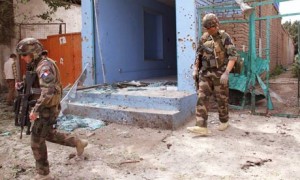Taliban’s new Political Game
A recent report based on a comprehensive interview with four senior Taliban officials, published on Monday by the Royal United Service Institute, indicates that the Taliban is ready to negotiate and accept a peace deal that would allow long-term US military presence in Afghanistan. The report also determined that the Taliban is now willing to make a decisive break with their so-called former allies, Al-Qaeda and speculates about the potential for a ceasefire.
The report’s authors have interviewed the Quetta Shura Taliban that is led by Mullah Mohammad Omar. It is generally considered the moderate wing of the Taliban leadership, and we don’t know if the more extremist wings are open to the idea.
The RUSI report concludes that the Taliban is not only open to negotiate for long-term peace and economic stability, but also is willing to seek advice from the US forces for further improvement of the Afghan National Army. The Taliban interviewed also said they would like to end attack on education centers, health centers and would negotiate about education for girls. One of the interviewers mentioned; “Taliban should not be considered as anti-education.”
Comparing the above report, that at least gives the sense of optimism for a long-term peace in Afghanistan after so many decades of war. Even so, just days before the RUSI report’s release, yet another tragic suicide attack happened near the headquarters of the NATO-led international coalition (ISAF) and U.S and Italian Embassies, killing at least six civilians (including four children).
According to The Guardian on Saturday 8 September 2012, a teenage suicide bomber with explosives hidden in a backpack has killed at least six civilians. The four child victims had gathered to play a game on an iPhone that was given to one of them by a foreigner. The suicide bomber acted like one of the street children then detonated his explosives while walking down the street into the diplomatic district targeted NATO office that is also close to the U.S and Italian embassies. “The killer was a child, aged 12 to 14,” said Haji Wasiullah Taj, chief of district 10 where the bombing happened.” This attack was one of many that have been instigated by the teenage suicide bombers in the past few years in the Afghanistan.
As always the Taliban claimed the responsibility for the blast. Not only that, the Taliban Spokesman Zabuhullah Mujahid also said that they had sent adult attacker to target a CIA base. But, due to long distance from the intelligence agency office from the explosion site, the attacker could not reach the target and detonated his explosives. However, the afghan officials blamed the Haqqani network for the blast as his group has been responsible for the most of attacks in recent years. It’s believed that this attack could be retaliation after the US government blacklisted the Haqqani network as a terrorist group on Friday.
Will the Taliban peace negotiation/ceasefire bring peace to the Afghanistan?
Taliban should not be the only concern of the international community and Government of Afghanistan. The Haqqani network, a terrorist group with-links to Al- Qaeda that is based in Pakistan and backed by the ISI of Pakistan should be vanished. The US and the international community need to put political pressure on Pakistan to cooperate with the peace process. Iran remains another concern to US and may be a huge embedment towards a long-term peace in Afghanistan. Therefore, peace reconciliation or negotiation with the Taliban could be helpful for the long-term peace in Afghanistan, but it is certainly not the only peace solution in the country.



